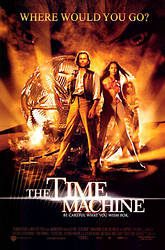 Director: Starring:
OTHER REVIEWS: Ghosts
of Mars Impostor The
Mummy Planet
of the Apes |
The Time Machine BY: DAVID PERRY "You must follow me carefully. I shall have to controvert one or two ideas that are almost universally accepted." Those are the first words out of the mouth of non-nominal The Time Traveler in H.G. Wells' The Time Machine. The novella, which is considered among the finest science fiction stories ever created (the best, you may ask, is an H.G. Wells story, but instead named The Invisible Man), came to theatres in 1960 with a version by George Pal, fresh off of adapting Wells' The War of the Worlds. Now, with special effects up to the task of recreating much of what Wells wrote about, his great-grandson Simon Wells has chimed in with his own version of the story. But it becomes apparent watching Simon Wells' new film that he has quite possibly never taken the time to read The Time Machine, or at least much of the subtext was lost on him while he was too busy making his animated films Balto, An American Tale: Fievel Goes West, or The Prince of Egypt. This new film mutes much of what H.G. Wells accomplished in 1895 by turning the story into little more than a glance at some miraculous special effects, neutering the story of all its sociological points. The George Pal version was not a masterpiece by any means, but it did understand much of the needed pathos for the story. When we watch that film's Time Traveler (portrayed effectively by Rod Taylor) sit and stare at the mannequin in the clothing shop window, understanding that for the long trip ahead, she is the only friend he has, the audience is brought into the anxiety that Pal and screenwriter David Duncan have created for the admittedly stoic character found in Wells' story. However, Simon Wells hasn't any interest in this -- his real addition to the story is a love-and-loss miscalculation that tries desperately to convince the audience that the Time Traveler's reasoning behind going to the future is just from a failed attempt to change the past. In this way, films like Back to the Future, Bill and Ted's Excellent Adventure, Terminator 2: Judgment Day, and Peggy Sue Got Married seem like much more intellectually stimulating cinema. The Time Traveler now has a name, Alexander Hartdegen (Pearce), and a purpose. One night in Central Park, he proposed to his girlfriend Emma (Guillory) before a mugger came out and shot her for the engagement ring. Over the course of the next four years, Alexander has worked to understand time travel and finally succeeds when he creates a huge aluminum time machine built around a parlor chair. But when he finds that even when changing the past Emma still dies at the same time, Alexander decides to journey into the future to, perhaps, understand why he cannot save her. Sitting in his parlor chair he watches New York go through modern society to a dystopia, through an ice age to a land of fertility. When he stops in 802,701, Alexander finds that the world has evolved into two races, the passive Eloi and the hunter Morlocks. The former are a dark-skinned civilization who live on the sides of cliffs in huge huts that would make the Lost Boys proud; the latter are huge, muscular beasts who live underground and eat the Eloi. Alexander finds that English has been passed on to the youths of the Eloi and soon befriends the local teacher, Mara (Mumba), in charge of teaching the kids English. Since she seems to be the only one he can have a conversation with other than the children, the relationship hints on further aspirations, but before he can go any further, she is taken captive by the Morlocks. More fuzziness ensues, culminating on a slew of scenarios H.G. Wells would scoff at. Jeremy Irons gets a chance to ham it up in the last act as the so-called über-Morlock, an albino genius who can get into the minds of both his own species and the Eloi. Irons portrays enough satisfaction with the idiocy of his role that he comes out of the movie unscathed, though the fact that this is his second consecutive over-the-top villain in a horrible film (following Dungeons & Dragons) does make it seem like the actor needs to fire his agent (as was said when Cuba Gooding, Jr., appeared in Snow Dogs: this is the type of role given to Oscar winners?). However, the sullenness portrayed by Guy Pearce only makes his character, the protagonist, an uninteresting whiney dolt. Much of the early scenes try to comically portray him as a mathematical savant, similar to John Nash, but the rest of the film has him in Ian Holm mode from The Sweet Hereafter and, while jumping across huge blue screens showing grumbling monsters, that type of acting ultimately fails. This film might as well have been called I Spit on H.G.
Wells' Grave -- for over ninety-minutes, Simon Wells has taken away the awe-inspiring
story and the pitch-perfect social commentary (the original served as a veiled indictment
of everything from science to socialism) from The Time Machine and turned it into
a showcase for the technicians over at Industrial Light & Magic. In the end, few plot
points remain from the story, making Simon Wells' The Time Machine as much an
adaptation of H.G. Wells' as Independence Day is an adaptation from Wells' The
War of the Worlds. |






